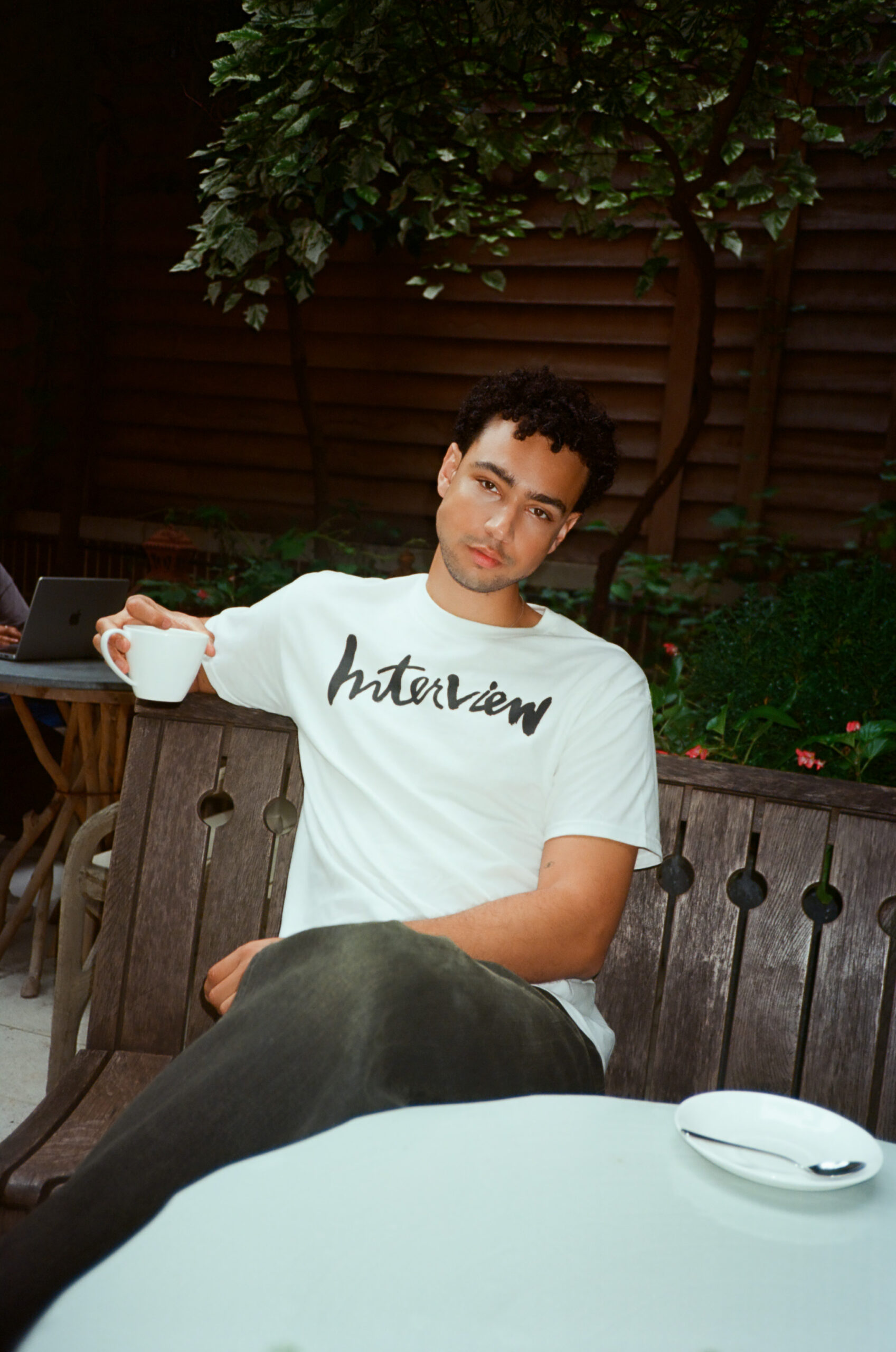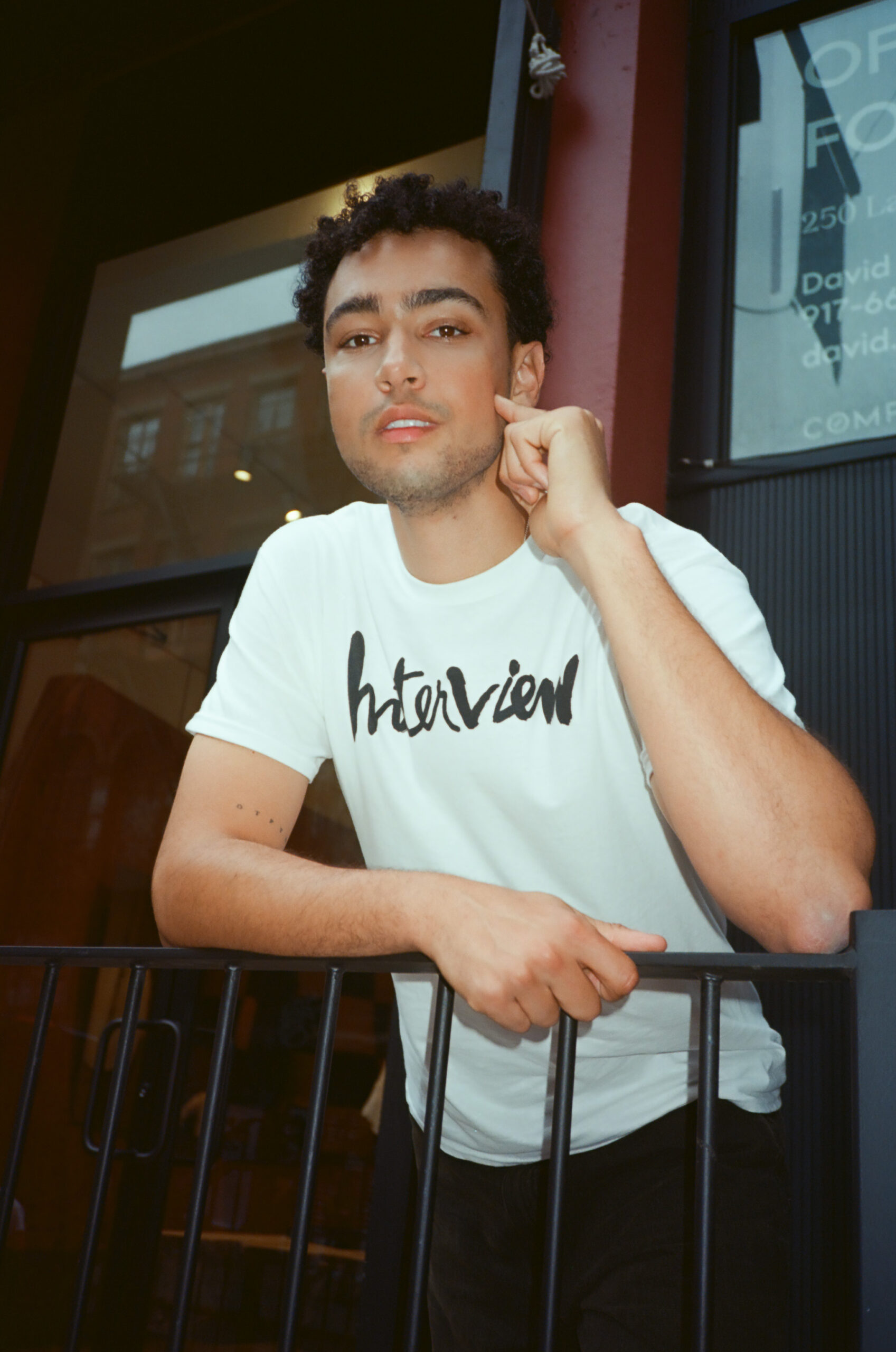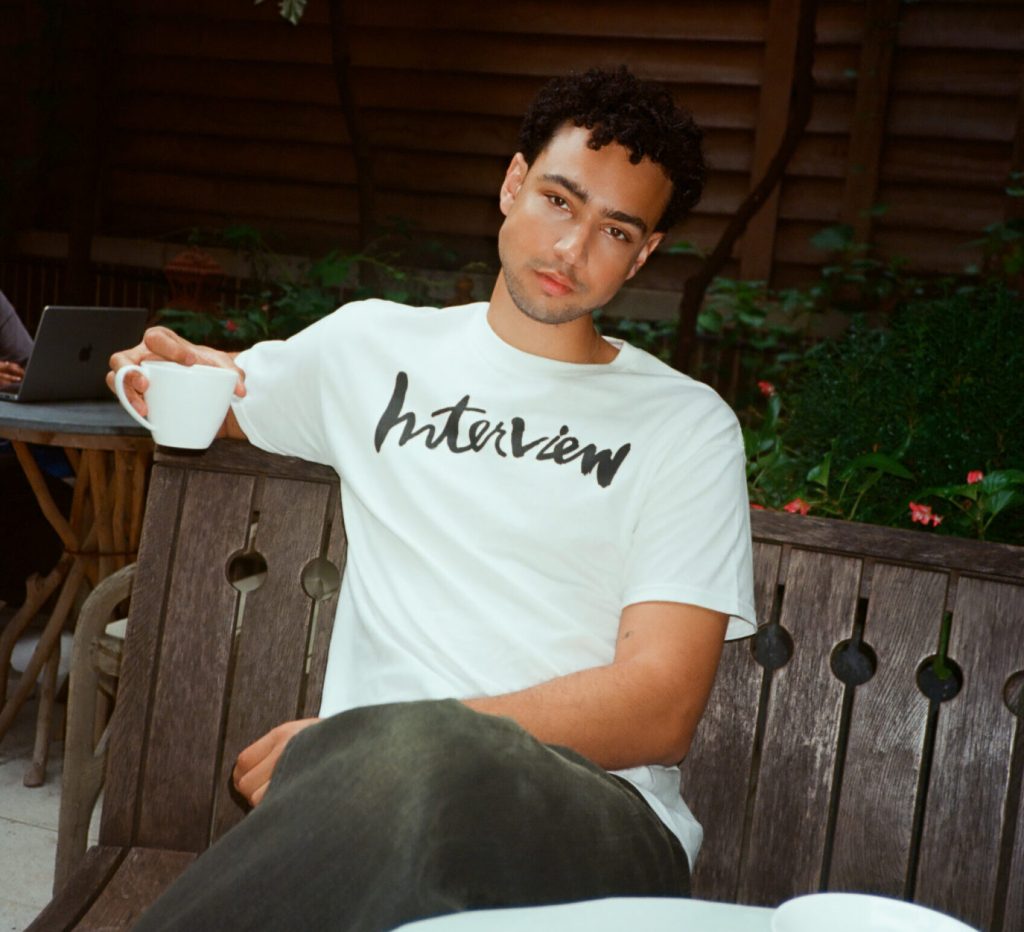
Archie Madekwe, photographed by Luca Bertea.
Archie Madekwe has emerged as England’s go-to lad for arthouse thrillers. He was left a gory, misaligned mess in Ari Aster’s Midsommar. But as Barry Keoghan’s sharp-tongued foil in Saltburn, he managed to flee the haunting, palatial estate mostly unscathed. Now, the 30-year-old actor returns as both producer and leading man in Alex Russell’s unsettling directorial debut Lurker, in which Madekwe plays a rising pop star who becomes the object of obsession for a retail clerk played by Théodore Pellerin. “I felt so much safer playing someone introverted,” he confessed to his close friend and fellow actor Harris Dickinson on a Zoom earlier this month. “To play someone who was overly confident felt a bit nerve-wracking to me.” Before the film’s August 22nd release, the pair dished on MySpace, mop tops, art school, and being closeted Beliebers.—KATHERINE SIMON
———
HARRIS DICKINSON: Hey mate, sorry.
ARCHIE MADEKWE: No worries.
DICKINSON: I walked around the corner to the shop and they were filming something in my area, which they always do. And even though we’re in film, sometimes I walk past sets and I’m like, “What are you filming?” [Laughs]
MADEKWE: [Laughs] Do you ask? I never ask and I always want to ask. I’m like, “I wonder what’s going on there.”
DICKINSON: Yeah, yeah. How are you doing?
MADEKWE: I’m all right, brother. I’m in Marseilles, baby. Until tomorrow.
DICKINSON: On a holiday?
MADEKWE: I came yesterday. It’s my friend’s 40th birthday, so I just came to have a little celebration with them. How are you?
DICKINSON: Very cute. Yeah, I’m good. I want to go straight into Lurker, if that’s okay, because it’s still fresh in my brain and I’ve resisted talking to you about it. But for context, for people reading this, we are friends, so I know you, and it was really cool to see you in this because it did feel like new territory. I hadn’t seen you play anyone like this before, and I loved what you did.
MADEKWE: Thanks.
DICKINSON: Aside from all the praise I have for it, I’m always intrigued about how people respond when they first read something. Was it like, “Okay, great, I know what this is.” Or was there a gap in understanding the film?
MADEKWE: Well, firstly, thank you. You’re very lovely. It means so much coming from a friend. Yeah, it was definitely the latter because when I was first sent the script, I was actually sent to audition for Matthew—the other part. So that was my introduction to the film and the lens I viewed it through. Then, they came back to ask me about playing Oliver. I have said this before, but I felt so much safer playing someone introverted, I don’t know why. So to play someone who was overly confident felt a bit nerve-wracking to me—and distant from the way that I see myself. So there was definitely a bit of a gap, but that was the thing that felt exciting.
DICKINSON: Yeah, there’s some self-obsession and ego there, and a lot of that is required to rise above everyone else as a musician. But despite that, there was also this sort of insecure child there who needed to be loved and accepted, and that also feels like an essential part of that world.
MADEKWE: Got to be.
DICKINSON: What did you do to understand an industry that we’re not involved in?
MADEKWE: I tried to talk to as many people in that orbit as I could. Rex Orange County was someone who I spent a lot of time with in preparation for this. He called me and said, “Listen, I’ve been thinking about your film, and I had this song that’s supposed to be on my album but I think it should be in your film instead. I’m going to send it to you and if you want it, you can have it. If not, then it’s all good.” And he sent me “Love and Obsession,” which ended up in the movie. It was just so funny because that song is exactly what the film is about.
DICKINSON: Did he read the script before that song?
MADEKWE: No, no. He’d written the song two years before about a love interest, but it made complete sense to the film and now that song feels like a character in the movie. But I also think that despite the specificity around that industry, I also pulled a lot from people that we know. We forget that a lot of the time these people are forced under intense scrutiny, and they’re just young people trying to figure it out. They’re masquerading as the boss and calling the shots. That’s when I think persona or these egos grow, and then alter egos grow out of that. These people start playing characters or versions of themselves because they think that’s what they’re supposed to do. I think it’s a lot harder in music because we, as actors, put on another costume, walk onto set, and then take it off when we go home. Whereas in music, that line becomes a lot more blurry. You are definitely playing a character when you step on stage and it’s difficult to keep that up forever. People are looking at you, in your eyes, calling your name, and they want to sleep with you because of the thing that you are doing and they’re fascinated by you. And that’s a different thing that we don’t really have. We have a version of that, but it’s a lot more intoxicating in music. Sorry, I’m taking a screenshot of you because you’re doing the exact same pose as that cowboy behind you.

DICKINSON: Holy shit. [Laughs] That cowboy gets too much airtime, man. Every Zoom I’m on. What was your relationship to music before this film? Didn’t you do musical theater?
MADEKWE: Yeah, I did do musical theater in school. I went to an all-boys rugby school before I went to the Brit school. I just did anything that I possibly could and people weren’t doing like, Roy Williams or Simon Stephens plays. They were doing Joseph and the Amazing Technicolor Dreamcoat. So I was in the choir and things like that. I always liked to sing, but I didn’t think that I was a singer. But I was a huge music fan, I still am. It’s a real kind of north star in my life.
DICKINSON: Did you have Myspace?
MADEKWE: I did.
DICKINSON: Do you remember your song?
MADEKWE: I actually do. I remember for a while that M.I.A’s “Paper Planes” was my song, and then I think it was an acoustic version of Lily Allen’s “The Fear.” [Laughs] “I want to be rich, and I want lots of money,” that was on my MySpace. What was yours?
DICKINSON: I remember one of them being like, some Papa Roach song. “Wake up, wake up…”
MADEKWE: [Laughs] Did you have Bebo?
DICKINSON: Did I have Bieber? I did like Bieber but we’re like two years apart, aren’t we? So I was probably 13 when he started releasing music.
MADEKWE: Wait. Oh my god. [Laughs] No, no, no, no, no, sorry. Did you think I said Bieber?
DICKINSON: I thought you said Bieber.
MADEKWE: No, no, no, no. [Laughs]
DICKINSON: Bebo, no. I never had Bebo.
MADEKWE: I love that you were going to go on a tangent about Bieber. [Laughs]
DICKINSON: [Laughs] Yeah.
MADEKWE: But I will say that I like his new album.
DICKINSON: I didn’t admit in public that I was into his music when I was younger.
MADEKWE: I remember there were these videos of him singing Chris Brown’s “With You” and he had the most insane riffs for a 12-year-old. I remember being like, “This kid’s going to be a star.”
DICKINSON: I also had his haircut.
MADEKWE: You could still do that now.
DICKINSON: It’s getting there.
MADEKWE: You could still play him now. You’re kind of aging with him.
DICKINSON: [Laughs] I don’t think he’s trying to do a biopic.
MADEKWE: I feel like that might be an interesting film. But yeah, I was a music fan, but I didn’t think of myself as a musician.
DICKINSON: Right. You were a producer on this. Why and when did you become a producer on it?
MADEKWE: It kind of happened organically. After I chemistry-tested with Theo [Pellerin] in Paris, we went for dinner and it was clear that we were going to do it. Then Alex [Russell] took us for dinner and said, “I’m going to have to ask you so many questions, I’m going to have to lean on you so much, I have no idea what I’m doing. But I’ve never been more ready to do something ever in my life than I am for this.” It unlocked this communication style that felt really organic. He’d call me and be like, “Can we talk through the cast? Do you have any suggestions?” And I’d make a list. I cast Sunny Suljic because I just worked with him on something and I was reaching out to people that I know, and getting tracks cleared, or whatever it was. Then one of the producers was like, “Well, you’re kind of doing more than some of the actual producers on this, so you should definitely come on as a producer.” That allowed me to be a part of conversations I’d never been a part of before.
DICKINSON: That makes sense knowing you, because you’re such a good facilitator and connector. You mentioned Sunny Suljic, who I love. He has such soulful energy. How old is he?
MADEKWE: Probably 22 now, but he could be 54. I love him.

DICKINSON: There’s one performance I really want to shout out as well, and it’s the guy who is your video editor.
MADEKWE: Oh my god, Daniel [Zolghadri]. He’s incredible.
DICKINSON: I’ve never seen such a quietly panicked performance.
MADEKWE: Do you remember him in Eighth Grade? He’s in it.
DICKINSON: Oh, of course.
MADEKWE: He’s a brilliant actor. Quiet panic is such a beautiful description for it, but it’s so thought through and he was so locked in.
DICKINSON: How loose was the script?
MADEKWE: It depends on the scene. Alex is an incredibly accomplished writer with things like The Bear, Beef, and Dave, so when it comes to rhythm of scenes, he was very specific. But when we have people like Zack Fox, who is just one of the most unbelievable improvisers, he’s just riffing for 20 minutes on his own. The scene where he comes to the green room was obviously improvised. Alex was pushing for that kind of stuff. He knew when to harness everybody’s strengths, and when to rely on the script.
DICKINSON: Yeah, because sometimes improv can be so aimless. If you just leave actors to go and do stuff, it will end up being really long and sometimes a bit boring.
MADEKWE: Totally, and I think he knew that that’s not what he wanted. He’s so specific about the rhythm of the scene. But what really helped and was kind of beautiful about this was that Alex was having the best day of his life every single day. I’ve never seen any director work like it, where they’re literally grinning ear to ear like a Cheshire Cat. It didn’t matter what kind of fire was happening—he didn’t care, he was making a movie. And because of that, he’d often be like to friends, “Yo, come hang. We’re over here, come pull up to the set.” It was so useful for me because it was an extension of this very L.A. world that Oliver was very much a part of, which I am not a part of, being very British. Alex was a hip-hop writer, so his friends are musicians and producers. So when we’d call cut and I’d go and walk to the snack table, I’m just chatting to all the people that Oliver would be hanging out with. It just kept me in that world.
DICKINSON: Was your character always supposed to be British?
MADEKWE: No. You probably feel this, I’m sure. Sometimes when people meet you and they realize you’re English, they go, “We can make him English.” So, when Alex realized I was English, he was like, “Maybe he could be an English musician, maybe that’s cool.” Unless there’s a specificity around that, I usually push away from that because I don’t want to be lazy. I’m happy to do the work and do the accent, but it made a lot of sense when we got into the character, him being this outsider. It added this other layer of mystique to him. It was always in the script that we were going to London, so it actually made that whole moment make more sense—him coming home and having a weird feeling around it.
DICKINSON: Well, L.A. specifically is very much geared towards entertainment, and a lot of people go there from all over the world.
MADEKWE: Totally. No one’s from there. I was trying to realize who my comparison was—someone who’s a British musician but feels like an L.A. artist—and Rex Orange County was my north star because most people do think he’s American. I went to school with him, he went to Brit.
DICKINSON: Wow, I didn’t know that. Yeah, I guess having been at the Brit School, you were adjacent to so many people that have gone on to become very successful musicians. But just to clarify to other people—because I feel like people think Brit School is this sort of glamorous thing in London—it’s not that at all.
MADEKWE: It’s in the sticks.
DICKINSON: Yeah. You have to work super hard to get in, it’s not glamorous.
MADEKWE: That’s for sure.
DICKINSON: It obviously breeds a lot of success and there’s a certain amount of ambition to be able to go there, but I feel like people on the outside could very easily look at Brit School and its alumni and think it’s like this—
MADEKWE: It’s just weird. It’s such a unicorn, that school. They really fight to keep it open. They’ve got to raise so much money themselves, and the sinks are falling off the wall. The magic of that school is giving young people the freedom to do whatever they want to do, whereas certain schools hinder that process, or they don’t give young people the time or space or energy to investigate that side of them. Brit just welcomes it with open arms, and that I think is why it’s created so many amazing artists.
DICKINSON: I didn’t get in, so I should be salty, but I’m not.
MADEKWE: Neither did Ed Sheeran.
DICKINSON: Well, we were pretty similar, me and Ed.
MADEKWE: You could play him in the biopic as well.


